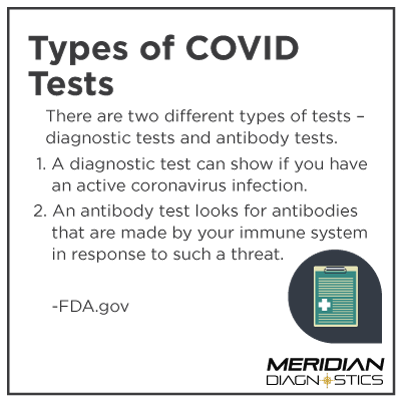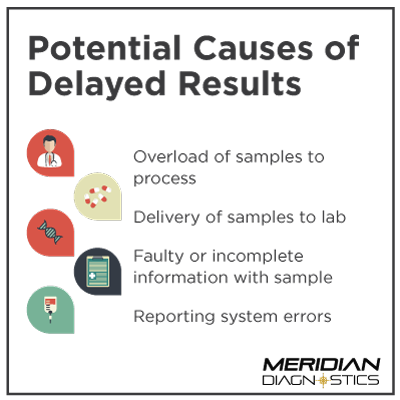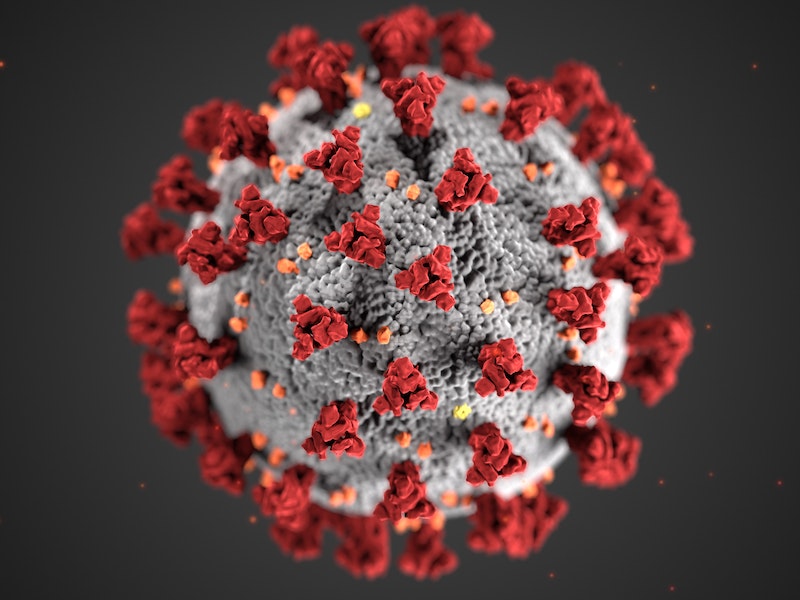The Lingering COVID Pandemic
The global pandemic has made a lot of us more conscious of our health, and for many, having regular Covid-19 testing performed may be a requirement as we travel or work in our respective fields. With Meridian Diagnostics and many labs in the country still processing COVID tests on a daily basis, time can be of the essence as fast results remain a top priority. For front line workers, especially those in healthcare, getting quick results is essential to ability to perform. However, there are still many questions about Covid-19 testing, and a lot of misinformation floating around. Here, we’ll help dispel some of the myths surrounding testing for the virus and give you tips on how to help get fast, effective, trustworthy results for yourself and loved ones.
Types of Testing
 The novel respiratory virus SARS-CoV-2, also known as Covid-19, is extremely contagious for those who are unvaccinated, and, unlike other types of cold and flu viruses, can live on hard surfaces for up to 72 hours. This, plus the proximity of people to one another in common places like grocery stores, schools, and workplaces has made many people nervous about being exposed to the virus. While some people may be asymptomatic or may only develop mild symptoms similar to a case of the flu, others can quickly develop severe respiratory issues – and there’s no way to be certain what your reaction and how severe your case may be. People may unwittingly spread the disease to others who have underlying health conditions that make them more vulnerable to complications. It’s reasons like these that make the need for accessible testing and fast results necessary.
The novel respiratory virus SARS-CoV-2, also known as Covid-19, is extremely contagious for those who are unvaccinated, and, unlike other types of cold and flu viruses, can live on hard surfaces for up to 72 hours. This, plus the proximity of people to one another in common places like grocery stores, schools, and workplaces has made many people nervous about being exposed to the virus. While some people may be asymptomatic or may only develop mild symptoms similar to a case of the flu, others can quickly develop severe respiratory issues – and there’s no way to be certain what your reaction and how severe your case may be. People may unwittingly spread the disease to others who have underlying health conditions that make them more vulnerable to complications. It’s reasons like these that make the need for accessible testing and fast results necessary.
It is especially important to be tested if you’ve been in close contact with someone who tested positive for the virus, if you’re showing symptoms of the disease, or if your primary care physician has recommended that you get tested.
The testing that you receive for Covid-19 is fairly simple, typically a swab of the nose (nasopharyngeal) or mouth (oropharyngeal). However, the speed that your results are delivered depends on what kind of test you take and the testing center that you receive it at. The Department of Health for each state oversees the processing of results in each state, and you may be able to see how long a wait is in your area by visiting the Department of Health and Human Services.
If you’ve been admitted to the hospital, you’ll probably be given a point-of-care test for Covid-19, which can deliver results in minutes. This is important, as it affects your treatment level and gives your health care team important information about how to properly protect themselves while still giving you the care you deserve. Bear in mind, however, that this type of rapid testing may occasionally return false negatives and may not accurately detect a newly developing case of Covid-19. If you are in the hospital, you may receive a follow-up test to the POC testing, to confirm your results.
The more common tests for Covid-19 involve a mucus sample via nasopharyngeal (nose) or oropharyngeal (throat) collection, collected either by a healthcare professional or by yourself, at home, using a sterile testing kit. The sample is then sent to a lab for processing. Due to the delivery involved in this process can take a day or two to receive results.
There are two main types of Covid tests: Diagnostic Tests and Antibody Tests. Diagnostic tests determine whether you have an active infection. They search for live samples of the virus. This indicates whether you should self-quarantine or isolate yourself from others. The antibody, or antiviral test, on the other hand, looks for antibodies that your immune system makes in response to a threat, such as a specific virus. Antibodies are your body’s natural response to fight infection and can show up days or even weeks after you’ve had the infection and may remain in the bloodstream for weeks (or longer). However, antibody tests aren’t generally used to diagnose Covid-19, and the presence of antibodies from this virus doesn’t mean that you’re immune from contracting the virus again in the future does not do it mean you are not contagious.
Meridian Diagnostics has a fast one-day turn-around-time for COVID19 results with staff dedicated to working around the clock to ensure results are delivered in a timely manner. Aside from COVID testing, the lab's viral panel includes the ability to detect Influenza A & B, RSV, hMVP, and streptococcus by utilizing the organization’s HDA instruments.
Helicase Dependent Amplification (HDA) is an isothermal DNA amplification method that is similar to conventional PCR, but utilizes the action of a thermostable helicase enzyme, rather than heat to separate the nucleic acids and enable labeled primers to anneal to the DNA template and elongate under the action of the polymerase. With the new reality of COVID-19 and other diseases throughout the United States, Meridian aims to contribute to the goal of providing essential healthcare through use of our validated Solana instruments. These kits are designed to rapidly differentiate and identify various pathogens found in serious respiratory syndromes.
Factors Affecting Turn-Around-Time
 Like any medical testing facility, labs that are processing tests for Covid-19 may be subject to some limitations for speed of processing and delivering results. Due to the sheer number of cases presented and tests submitted, many labs may be backed up, despite the hard work and careful attention to detail of the workers there.
Like any medical testing facility, labs that are processing tests for Covid-19 may be subject to some limitations for speed of processing and delivering results. Due to the sheer number of cases presented and tests submitted, many labs may be backed up, despite the hard work and careful attention to detail of the workers there.
The testing capability of a region may also impact the speed at which results are delivered. Urban areas may have more testing centers available, and more medical offices to process the tests, while smaller towns and rural areas may only have one facility to process the entire region.
Another factor to remember is that the labs testing the results can only move as fast as the information that they’re given. Faulty or incomplete paperwork for submitted test samples can slow the process down a lot, especially if those testing the submissions have to track down the information that they need for the best results, or collection samples that have been contaminated or otherwise compromised may be harder to test, if not impossible, and results may not be as accurate. For people taking at-home tests and mailing them off to a lab for results, it’s very important to carefully follow the instructions included with the kit, including the sanitation and safety protocols for collection, as well as how to properly store the test and send it off.
Incubation Period
Scientists agree that the incubation period for the virus can be up to 14 days. At this time, you may develop flu-like symptoms including fever or chills, body aches, headaches and nausea, and exhaustion. The most distinctive characteristic of Covid-19, however, is the lack of taste and smell for individuals.
Some people may develop mild symptoms of the disease, and simply decide that they have it based on their symptoms. However, it is important that you get tested, even if you believe your case to be mild. You may be asked to fill out a tracing report, helping others that you’ve been in contact with know if they’ve been exposed to the virus. This can help slow the spread of disease or may help people who have been exposed get treatment early, to reduce the chances of severe complications.
With a longer incubation than most types of viruses, people may falsely test negative for up to 5 days after exposure to Covid. Others may not realize that they have the virus, if they aren’t showing symptoms and no one around them, at work or home, is showing symptoms of the virus. However, it’s just this asymptomatic nature of Covid-19 that makes it important to have regular testing, especially if you’re a front-line worker, to ensure that you aren’t passing the virus to others.
If you think you may have had Covid-19 and recovered from it, an antibody test could tell you for sure. This test can be administered by medical professionals quickly at your primary care physician or, a testing site.
Covid-19 is a very contagious virus with deadly potential. Getting the right information is critical. The US Centers for Disease Control has a wealth of information, with up to the minute changes as more is known, about the virus, how it’s transmitted, and the best ways to keep you and your loved ones safe. More information may be found here, or by calling the Covid helpline at 800-CDC-INFO (800-232-4636).
Meridian Diagnostic's Role In COVID-19 Testing
Meridian Diagnostics is an independent reference laboratory whose team of laboratory technicians and scientists has had experience testing Covid-19 and other viral/respiratory pathogens since the outbreak first began. If your facility needs an established testing resource, reach out to us to start the conversation about our testing solutions.
Rhyan Walcott, Meridian Diagnostic's Chief Executive Officer, says “Many of our regular clients include hospitals, physicians, long-term care, assisted living facilities and urgent care centers. Naturally, as the nation’s COVID19 rates staggers so does the testing demand our lab faces. Meridian Diagnostics will continue to proudly help serve the needs of our healthcare providers while providing support through other respiratory pathogen testing capabilities included in our viral panel."
Contact Meridian Diagnostics today for more information on diagnostic testing services: info@meridiandiaglabs.com.


